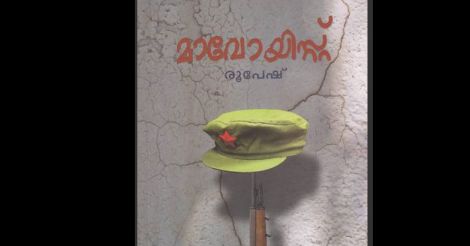Ever since his recent arrest, Roopesh has become synonymous with Maoists in Kerala. Though his name has been doing the rounds in the media for sometime now, he has not been familiar to the public.
Roopesh, however, has a lesser known face – that of a writer, or to be precise a novelist. Roopesh became a known name to the reading public through his essays on the Left extremist politics and environmental issues relating to the Western Ghats, which he published in some leading weeklies in Malayalam, while he was in hiding. While the articles could be looked upon as the natural way of expression of an intellectual, the fact that he authored a novel is a bit odd, as Left wing radicals rarely indulge in this form of literary pursuit.
The novel is aptly titled 'Maoist'. To make it more apt, the book has a cover featuring a Maoist commander's green cap with a red star on it.
The plot could be summed up as the existential dilemma of an IAS officer who finds it difficult to choose between her career and her political stance woven amidst present day crises and memories from the past.
Indira aka Indu, is the granddaughter of Comrade Chellappan, who took part in the in/famous Pulppally police station attack along with Comrade Varghese who was shot dead by the police. Struck by poverty and the tribal-like innocence, she joins a college in the town where she is welcomed by a group of youngsters with revolutionary ideas. A major part of the plot is about the relationship she develops with the group, especially Sherin aka Shery, a firebrand young woman.
The readers come to know about all these through the memories of Indu after Shery comes in search of her after a long time. The narrative has two settings, one the present in which Indu is an IAS officer and part of an anti-naxal core committee and two, her past which is filled with men and women who personified the spirit of revolution.
The story evolves through the lives of Indu and Sherry and the firm bonding between them. At one point, the novelist even gives an explicit lesbian undertone to the relationship between them, apparently in a bid to make clear his stance on sexual minorities.
The novel puts in question a lot of issues among which the post 70s dilemma among the Left extremists remains on top. It talks of how globalisation invades private life through the caricatures of an artist who compromises with the global art market, a hotel manager and a TV producer. All of them were aspiring revolutionaries in their youthfulness. As an anti-thesis, the novelist portrays a few characters like Sherry who never compromises their ideology and conviction.
A political manifesto in the form of a novel, 'Maoist' makes explicit statements too often. Through the thoughts of Indu, it hopes that an atmosphere in favour of a revolution is in the making in Kerala also. "The never-before intensity of deaths due to malnutrition in Attappady, farmer suicides, lay offs from corporate companies, Dalit sufferings and massive evacuations for bigger projects facilitate an atmosphere for a revolution in Kerala also," Indu thinks aloud.
She finds populist budget sops such as free ration, writing off loans and employment guarantee scheme as government's ploys to dilute the growing dissent among the public which may fuel a revolution.
The novel observes that “all the major agitations that happened in Kerala during the past 10 years were not led by mainstream political parties”.
As a powerful statement aiming at igniting the spirits of revolutionaries, the novel at one point says that Maoists are killed in fake encounters as imprisonment of years could not douse down the fire within them. Interestingly, the novelist puts these words into the mouth of an anti-naxalite wing officer.
Perhaps in a bid to be realistic, the novel doesn't portray a fake revolution which the Left forces win. As it happens in reality, here also the activists get killed by state machinery one by one even as the remaining ones continue their journey to ‘change’ tirelessly.
The work cannot be treated as a brilliant one, going by any literary yardstick. Neither the plot nor the craft are compelling. Yet what interests the reader is the predicament of the author himself for it is essentially some notes from the underground.



































































































































































































































































































.jpg.image.160.84.jpg)





































































































































.jpg.image.160.84.jpg)











































Disclaimer
The comments posted here/below/in the given space are not on behalf of Manorama. The person posting the comment will be in sole ownership of its responsibility. According to the central government's IT rules, obscene or offensive statement made against a person, religion, community or nation is a punishable offense, and legal action would be taken against people who indulge in such activities.